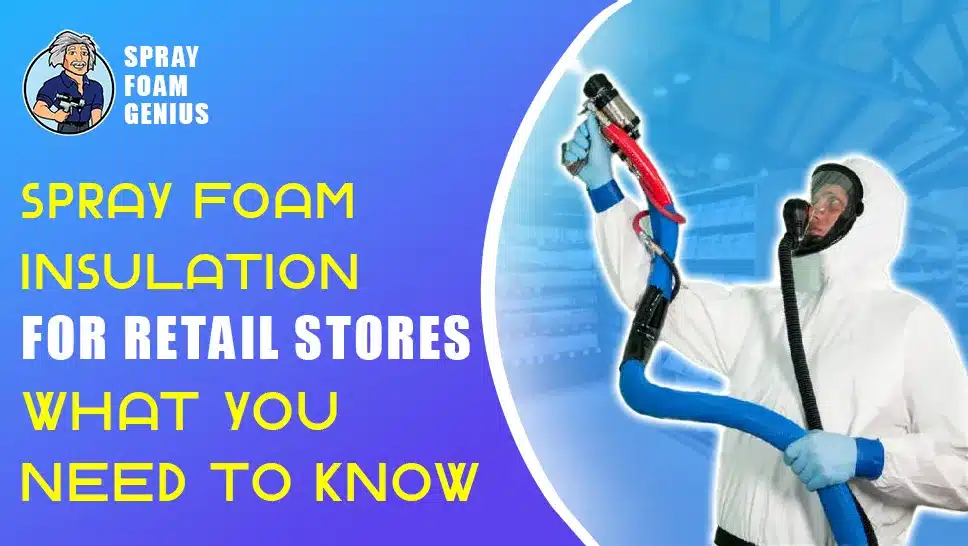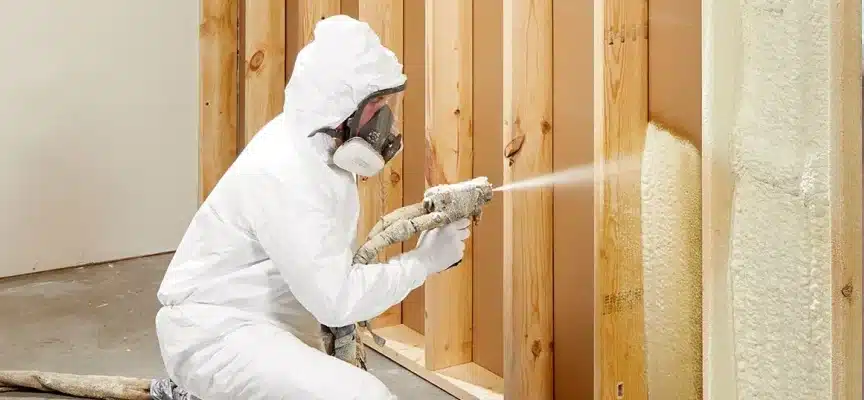
In the competitive world of retail, creating an inviting, energy-efficient environment is crucial for attracting and retaining customers. A comfortable store not only enhances the shopping experience but also has a direct impact on your bottom line. One of the most effective ways to achieve this is through spray foam insulation. This guide will explore everything you need to know about spray foam insulation for retail stores, from its benefits to the installation process, ensuring you can make the best decision for your business.
Why Choose Spray Foam Insulation for Your Retail Store?
Retail stores present unique challenges when it comes to insulation. Large open areas, high ceilings, and extensive storefront windows are common features that can make temperature regulation difficult. Traditional insulation methods often fall short in addressing these challenges, leading to inconsistent indoor temperatures, high energy costs, and even structural issues over time.
Spray foam insulation stands out as an ideal solution for retail spaces due to its versatility and superior performance. By creating an airtight seal, spray foam effectively addresses the specific needs of retail environments, ensuring both energy efficiency and enhanced comfort.
Key Benefits of Spray Foam Insulation
1. Superior Energy Efficiency
One of the most significant advantages of spray foam insulation is its ability to reduce energy consumption. Retail stores typically have high energy demands due to extended operating hours and the need to maintain a comfortable environment for both customers and employees. Spray foam insulation minimizes air leakage by filling gaps and cracks, creating a continuous barrier that significantly reduces the workload on heating and cooling systems. This leads to lower energy bills and a more sustainable business operation.
2. Enhanced Comfort for Customers and Employees
Comfort is key in a retail setting. A store that is too hot or too cold can drive customers away, leading to lost sales and reduced customer satisfaction. Spray foam insulation helps maintain a consistent indoor temperature, ensuring that your store remains comfortable regardless of the weather outside. This not only improves the shopping experience but also creates a better working environment for your employees, potentially increasing productivity.
3. Effective Noise Reduction
Retail stores are often bustling environments with a constant flow of customers, employees, and outside noise. Managing noise levels is crucial to creating a pleasant shopping atmosphere. Spray foam insulation acts as an effective sound barrier, reducing the transmission of noise from outside the building and between different areas within the store. This can be particularly beneficial in stores located in busy urban areas or near highways.
4. Moisture and Mold Resistance
Moisture control is another critical factor in maintaining a healthy retail environment. Excess moisture can lead to mold growth, which can damage products, compromise structural integrity, and pose health risks to employees and customers. Spray foam insulation provides a moisture barrier that helps prevent these issues by sealing out humidity and moisture. This not only protects your store but also reduces maintenance costs associated with moisture-related damage.
5. Increased Structural Integrity
In addition to its insulating properties, spray foam insulation adds rigidity to walls and ceilings, enhancing the overall structural integrity of your building. This is particularly important in areas prone to extreme weather conditions, where added strength can help protect your store from wind damage, storms, and other environmental hazards.
How Spray Foam Insulation Works
The Science Behind Spray Foam
Spray foam insulation is created by mixing two liquid components that react to form a foam. When sprayed onto surfaces, the foam expands rapidly, filling gaps and sealing off any potential air leaks. This expansion allows the foam to reach into tight spaces and crevices, ensuring a comprehensive seal that other insulation materials cannot provide.
Types of Spray Foam Insulation
There are two main types of spray foam insulation: open-cell and closed-cell. Each type has unique characteristics that make it suitable for different applications within a retail environment.
Open-Cell Spray Foam
- Lightweight and Flexible: Open-cell spray foam is less dense and more flexible than its closed-cell counterpart. It is ideal for insulating interior walls and ceilings where breathability is important.
- Excellent Soundproofing: The open-cell structure of this foam makes it particularly effective at absorbing sound, reducing noise transmission between rooms and from outside sources.
- Cost-Effective Option: Open-cell foam is generally more affordable than closed-cell foam, making it a popular choice for large areas where budget constraints are a consideration.
Closed-Cell Spray Foam
- High Insulation Value (R-Value): Closed-cell foam has a higher R-value per inch, meaning it provides superior insulation. This makes it ideal for areas that require maximum thermal resistance, such as exterior walls and roofs.
- Moisture Barrier: The dense structure of closed-cell foam acts as a vapor barrier, preventing moisture from penetrating walls and ceilings. This is particularly beneficial in humid climates or areas prone to flooding.
- Structural Strength: Closed-cell foam adds rigidity to the building structure, which can be crucial in regions that experience high winds, heavy snowfall, or seismic activity.
The Application Process
The process of applying spray foam insulation involves several key steps that ensure a successful installation and optimal performance.
1. Initial Assessment and Consultation
Before installation begins, a professional insulation contractor will assess your retail space to determine the best approach. This includes evaluating the building’s structure, identifying areas that require insulation, and discussing your energy efficiency goals. The contractor will also recommend the most suitable type of spray foam for your needs.
2. Preparation of the Space
Preparation is critical to a successful spray foam installation. The area to be insulated must be cleared of old insulation and debris. Surfaces should be cleaned and prepped to ensure proper adhesion of the spray foam. Additionally, the contractor may need to seal off certain areas of the store to prevent overspray and protect your inventory.
3. Application of the Foam
Using specialized equipment, the contractor will apply the spray foam to the designated areas. The foam is sprayed as a liquid and expands within seconds to fill gaps and create an airtight seal. Depending on the scope of the project, this step can take several hours to complete.
4. Curing and Inspection
After application, the foam needs time to cure. The curing process can take anywhere from a few hours to a full day, depending on the type and thickness of the foam used. Once the foam has fully cured, the contractor will conduct a thorough inspection to ensure that the insulation has been applied correctly and that there are no gaps or weak spots.
5. Cleanup and Final Touches
The final step in the process is cleanup. The contractor will remove any excess foam and clean the work area, leaving your retail space ready for business. If necessary, they may also make repairs or touch-ups to ensure a polished finish.
Cost Considerations and Return on Investment (ROI)
Understanding the Costs
The cost of spray foam insulation for retail stores can vary based on several factors, including the size of the area to be insulated, the type of spray foam used, and the complexity of the installation. On average, spray foam insulation tends to be more expensive than traditional insulation materials like fiberglass or cellulose. However, the long-term benefits often justify the higher upfront investment.
Factors Influencing the Cost
- Area Size: Larger spaces require more material and labor, which increases the overall cost.
- Type of Foam: Closed-cell foam is generally more expensive than open-cell foam due to its higher density and superior insulation properties.
- Installation Complexity: Areas that are difficult to access or have unique structural features may require additional labor, raising the cost of installation.
Long-Term Savings and ROI
While the initial cost of spray foam insulation may be higher, the long-term savings can be substantial. Here’s how spray foam insulation offers a strong return on investment:
1. Energy Savings
One of the most significant contributors to ROI is the reduction in energy costs. By creating a more efficient thermal envelope, spray foam insulation reduces the amount of energy needed to heat and cool your retail space. Many businesses see energy savings of 20% to 30% after installing spray foam insulation, which can quickly add up over the years.
2. Lower Maintenance Costs
Spray foam insulation’s ability to prevent moisture intrusion and resist mold growth can save you money on maintenance and repairs. By protecting your building’s structure from moisture-related damage, spray foam helps avoid costly repairs that might otherwise be necessary with other types of insulation.
3. Increased Property Value
Insulating your retail store with spray foam can increase the overall value of your property. Energy-efficient buildings are often more attractive to potential buyers, should you decide to sell or lease your space in the future. Additionally, the enhanced structural integrity provided by closed-cell spray foam can be a selling point for prospective buyers.
4. Incentives and Rebates
In some areas, there are incentives or rebates available for businesses that invest in energy-efficient upgrades like spray foam insulation. These financial incentives can help offset the initial installation cost, making the investment even more attractive.
How to Choose the Right Spray Foam Insulation Contractor

Choosing the right contractor is critical to the success of your spray foam insulation project. Here are some tips to help you make the best choice:
1. Check Credentials and Experience
Ensure the contractor is licensed, insured, and has experience with commercial spray foam insulation projects. Ask for references and check reviews to gauge their reputation and quality of work.
2. Request a Detailed Estimate
A reputable contractor will provide a detailed estimate that includes the cost of materials, labor, and any additional services. Make sure you understand what is included in the estimate and ask about any potential additional costs.
3. Inquire About Warranties
Find out if the contractor offers any warranties on their work. A warranty provides peace of mind that any issues that arise after installation will be addressed promptly.
4. Consider Energy Efficiency Expertise
Choose a contractor who is knowledgeable about energy efficiency and can help you maximize the benefits of spray foam insulation. They should be able to recommend the best type of foam for your specific needs and offer advice on how to improve your building’s overall energy performance.
Take the Next Step Toward a More Efficient Retail Store
Spray foam insulation offers a multitude of benefits for retail store owners looking to improve energy efficiency, enhance customer comfort, and protect their building’s structure. From its superior insulating properties to its ability to add structural strength, spray foam is a smart investment that can pay off in both the short and long term.
If you’re ready to explore the advantages of spray foam insulation for your retail store, Contact Spray Foam Genius Marketing today. Our team of experts specializes in providing top-notch insulation services tailored to your business needs. Whether you’re looking to reduce energy costs, improve indoor comfort, or enhance the overall value of your property, we’re here to help.
Call us at 877-840-FOAM for USA and 844-741-FOAM for Canada visit our website at sprayfoamgeniusmarketing.com, or email us at [email protected] to get started.
Don’t wait—take the first step towards a more energy-efficient and comfortable retail space today!
- 5 Google My Business Hacks to Double Your Leads for Spray Foam Insulation Contractors - January 14, 2025
- Why Spray Foam Contractors Cannot Ignore Reputation Management in 2025 - January 13, 2025
- Local SEO Secrets Every Spray Foam Contractor Must Know to Win in 2025 - January 13, 2025

